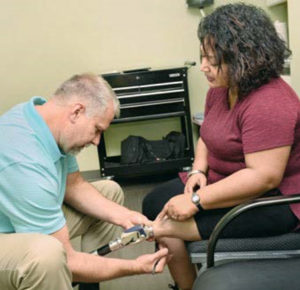“Patients have a lot more control over their destiny if they feel comfortable talking with their practitioner. I guarantee I am going to listen to you…”
While pursuing a bachelor’s degree in Movement and Sports Studies at East Stroudsburg University of Pennsylvania, Chris Rogers began his career in 1990 as a prosthetic and orthotic technician. Intending to pursue physical therapy, a shadowing opportunity at a prosthetics and orthotics facility while in college shifted his focus. It was there that things “just clicked.” He was drawn to both the hands-on aspect of designing and adjusting devices and the therapeutic component of working with patients. He continued on at the facility where he had shadowed, taking any jobs he could just to be in proximity of this work. He became an assistant to the owner and then a full-time technician while finishing college. To become a certified prosthetist, Chris went on to study at Northwestern University Medical School of Chicago. Upon completion, he worked in the field as a board certified prosthetist and office manager of a successful prosthetics and orthotics company in Pennsylvania before relocating to western Massachusetts in 2001. Here he worked alongside Northwestern University alum Craig Babyak, and in 2006 they co-created Prosthetic & Orthotic Solutions, LLC.
Chris is committed to ensuring his practice provides patients with not only the best device possible, but also the best experience possible. His first interactions with patients often come after they have received a life-changing diagnosis. The process of rebuilding – both physically and emotionally – brings with it many questions and a desire to regain a sense of control. Chris is respectful of that.
 Explains Chris, “Patients have a lot more control over their destiny if they feel comfortable talking with their practitioner. I guarantee I am going to listen to you. I want you to come in and be yourself. The more information you give me about your lifestyle, the more specific I can get with your device, and the more options I can give you for moving forward. ”
Explains Chris, “Patients have a lot more control over their destiny if they feel comfortable talking with their practitioner. I guarantee I am going to listen to you. I want you to come in and be yourself. The more information you give me about your lifestyle, the more specific I can get with your device, and the more options I can give you for moving forward. ”
Chris also understands the immediacy of a patient’s symptoms and needs. So much of what he does is related to improving a patient’s functioning in their everyday life. He is there to answer questions, offer hope in the tough moments, and share a good laugh in the lighter moments. This is a life-long project for his patients, and his is invested in being a key part of their journey.
“We don’t often realize how much we miss something until it’s taken away,” says Chris. “I enjoy the process of getting a person back to where they want to be.”

